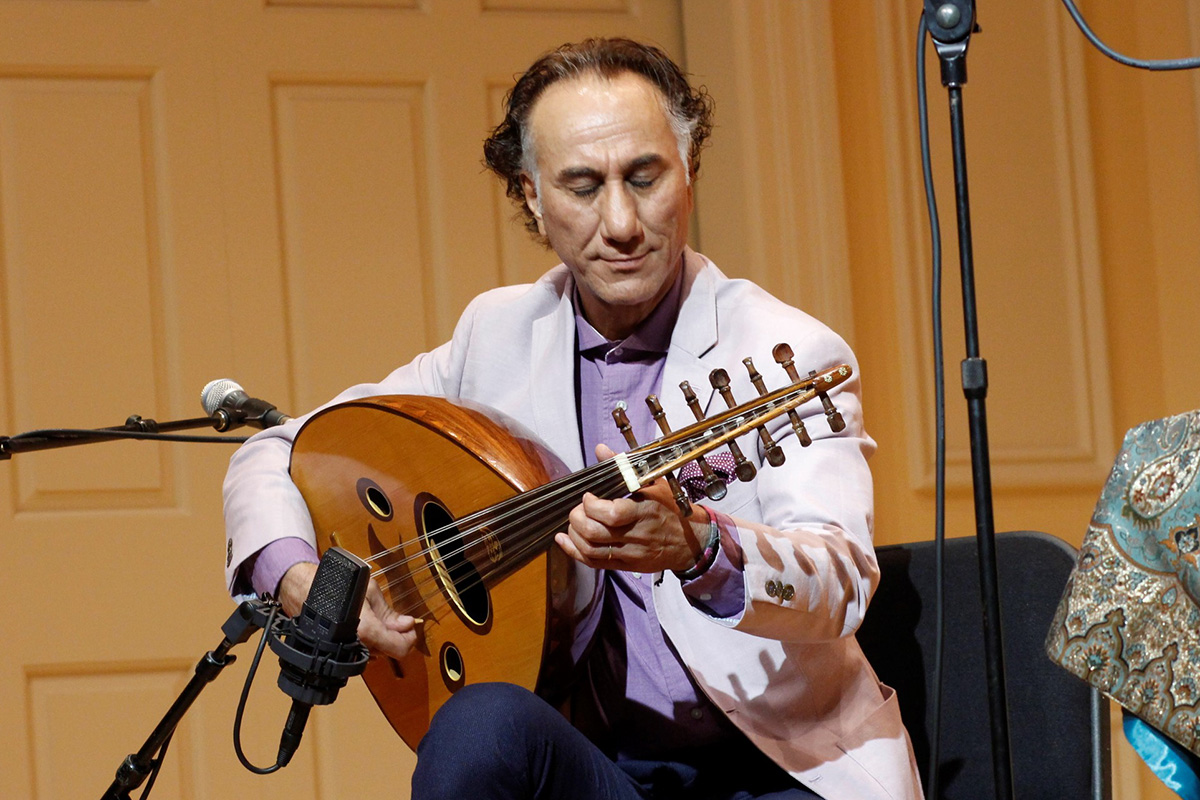Watching Rahim AlHaj perform is a joyous experience. Smiles inadvertently creep onto his lips while he playfully improvises on an instrument that seems to be more a part of him than not. It’s like watching an intimate conversation between two friends, and you cannot help but be drawn in.
On his new Smithsonian Folkways album, Letters from Iraq, his music exudes the usual warmth, brilliance, and creativity while blending Iraqi musical forms with a Western classical chamber ensemble—building a musical bridge between his war-torn home country and his adopted home in the United States.
Born in Baghdad, Iraq, AlHaj learned how to play the oud at nine years old. His second grade teacher gifted him the instrument, a wooden stringed instrument similar to a lute, telling him, “You are a born musician.” Since then, he has kept an oud by his side, sometimes literally in his bed, obsessed with its beautiful sound. He went on to study at the Institute of Music in Baghdad and graduated in 1990.
Eventually he was forced to leave Iraq due to his activism against the Saddam Hussein regime, but not before being twice imprisoned and tortured. In 1991 after outbreak of the first Gulf War, his mother paid for him to be snuck into Jordan, where he was forced to leave his oud behind. It’s a loss he has never gotten over.
“I have such longing, yearning, to this first oud, my first love,” he mourns. “But I say to myself, you are alive.”

After leaving Iraq, AlHaj lived in Jordan for three years, then moved to Syria where he met his wife, Nada Kherbik. They moved to the United States in 2000 as political refugees and have since resided in Albuquerque, New Mexico. He has continued to improvise and innovate with his oud—albeit a newer model.
Describing his morning routine, AlHaj says, “I wake up, drink a glass of water, and I go to my oud. I kiss it and say, ‘Good morning, buenos dias.’ And I start playing. Before anything I do, every day the same ritual.” He suggests, somewhat jokingly, that his wife is sometimes jealous of his cherished instrument.
For Letters from Iraq, AlHaj transposes the stories and sentiments within actual letters written by Iraqis into virtuosic instrumentals. Each composition is inspired by a specific letter, its author referenced in the title.
“Eastern Love – Sinan” starts with beautiful, melodic introduction, first played by the chamber ensemble and then by the oud, which quickly speeds up to a faster-paced, dance-like rhythm. AlHaj’s joy can be felt in the quick phrasing and playful skipping rhythms— innovating form and genre.
“Forbidden Attraction – Tiama” begins in a minor gradually becoming more and more hopeful until the oud enters, playfully improvising on the violin motif. His compositions weave a delicate, contemporary musical tapestry of the yearning of exile.
In “The Last Time We Will Fly Birds – Riyadh,” his sadness and yearning for his homeland can be acutely felt. The chamber ensemble enters with a slow, repetitive minor motif accompanied by drone in the lower strings emphasizing the feeling of foreboding. This drone continues to accompany AlHaj’s oud solos that are interspersed throughout.
A virtuosic soloist and talented composer, AlHaj has released ten CDs, been nominated for two GRAMMY Awards, and been awarded the National Endowment for the Arts National Heritage Fellowship (2015). Letters from Iraq is his second collaboration with Smithsonian Folkways, following When the Soul Is Settled: Music of Iraq (2006). While the first album focused on solo works, this one combines his oud with a string chamber ensemble, resulting in a truly innovative album. It sets a new precedent for contemporary composition and performance of the oud.
SarahVictoria Rosemann earned her master’s degree in ethnomusicology from Wesleyan University. She was a media intern for the Smithsonian Folklife Festival in the summer of 2016.


